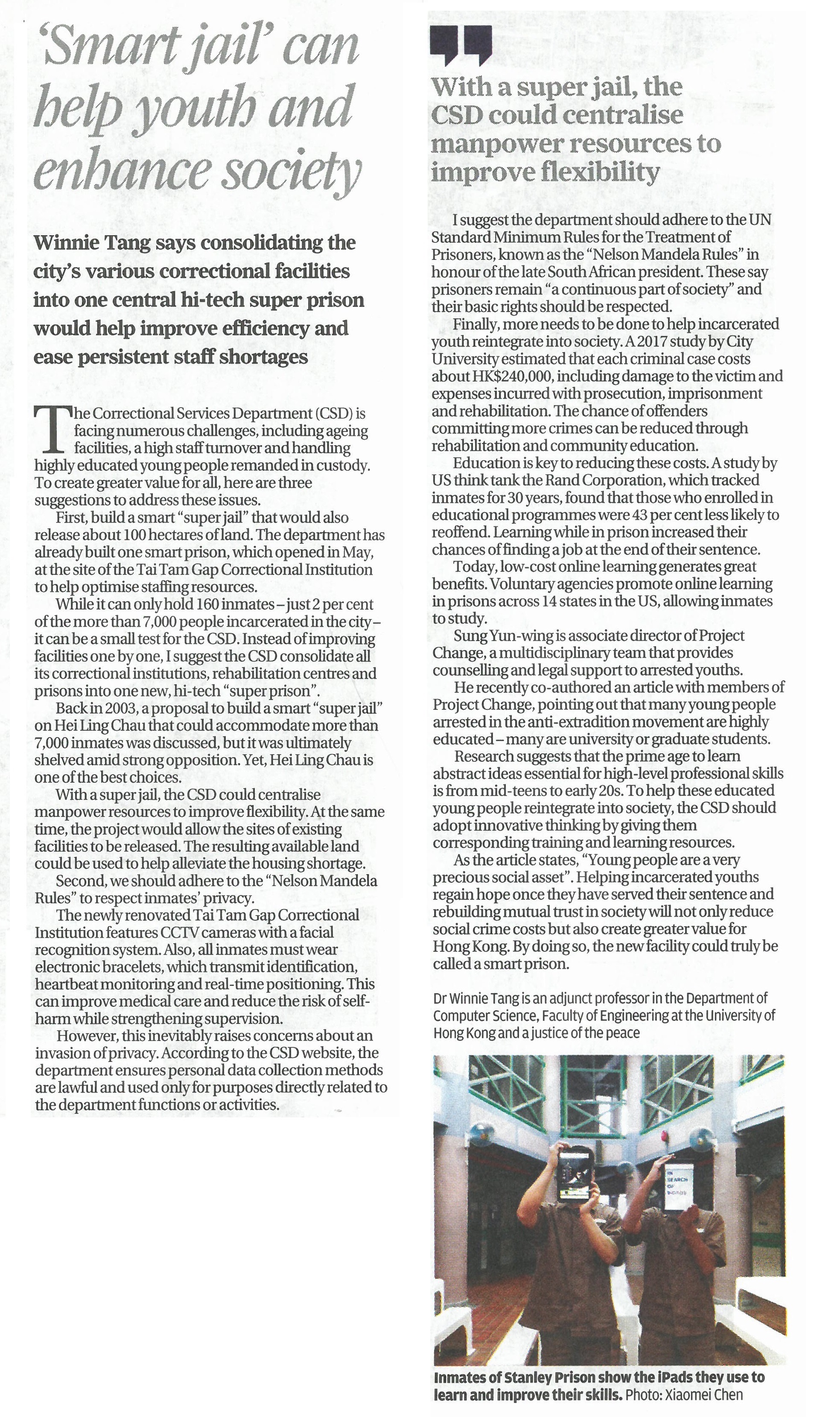網上版請按此

'Smart jail' can help youth and enhance society
Winnie Tang says consolidating the city's various correctional facilities into one central hi-tech super prison would help improve efficiency and ease persistent staff shortages
The Correctional Services Department (CSD) is facing numerous challenges, including ageing facilities, a high staff turnover and handling highly educated young people remanded in custody. To create greater value for all, here are three suggestions to address these issues.
First, build a smart "super jail" that would also release about 100 hectares of land. The department has already built one smart prison, which opened in May, at the site of the Tai Tam Gap Correctional Institution to help optimise staffing resources.
While it can only hold 160 inmates - just 2 per cent of the more than 7,000 people incarcerated in the city - it can be a small test for the CSD. Instead of improving facilities one by one, I suggest the CSD consolidate all its correctional institutions, rehabilitation centres and prisons into one new, hi-tech "super prison".
Back in 2003, a proposal to build a smart "super jail" on Hei Ling Chau that could accommodate more than 7,000 inmates was discussed, but it was ultimately shelved amid strong opposition. Yet, Hei Ling Chau is one of the best choices.
With a super jail, the CSD could centralise manpower resources to improve flexibility. At the same time, the project would allow the sites of existing facilities to be released. The resulting available land could be used to help alleviate the housing shortage.
Second, we should adhere to the "Nelson Mandela Rules" to respect inmates' privacy.
The newly renovated Tai Tam Gap Correctional Institution features CCTV cameras with a facial recognition system. Also, all inmates must wear electronic bracelets, which transmit identification, heartbeat monitoring and real-time positioning. This can improve medical care and reduce the risk of self-harm while strengthening supervision.
However, this inevitably raises concerns about an invasion of privacy. According to the CSD website, the department ensures personal data collection methods are lawful and used only for purposes directly related to the department functions or activities.
I suggest the department should adhere to the UN Standard Minimum Rules for the Treatment of Prisoners, known as the "Nelson Mandela Rules" in honour of the late South African president. These say prisoners remain "a continuous part of society" and their basic rights should be respected.
Finally, more needs to be done to help incarcerated youth reintegrate into society. A 2017 study by City University estimated that each criminal case costs about HK$240,000, including damage to the victim and expenses incurred with prosecution, imprisonment and rehabilitation. The chance of offenders committing more crimes can be reduced through rehabilitation and community education.
Education is key to reducing these costs. A study by US think tank the Rand Corporation, which tracked inmates for 30 years, found that those who enrolled in educational programmes were 43 per cent less likely to reoffend. Learning while in prison increased their chances of finding a job at the end of their sentence.
Today, low-cost online learning generates great benefits. Voluntary agencies promote online learning in prisons across 14 states in the US, allowing inmates to study.
Sung Yun-wing is associate director of Project Change, a multidisciplinary team that provides counselling and legal support to arrested youths.
He recently co-authored an article with members of Project Change, pointing out that many young people arrested in the anti-extradition movement are highly educated - many are university or graduate students.
Research suggests that the prime age to learn abstract ideas essential for high-level professional skills is from mid-teens to early 20s. To help these educated young people reintegrate into society, the CSD should adopt innovative thinking by giving them corresponding training and learning resources.
As the article states, "Young people are a very precious social asset". Helping incarcerated youths regain hope once they have served their sentence and rebuilding mutual trust in society will not only reduce social crime costs but also create greater value for Hong Kong. By doing so, the new facility could truly be called a smart prison.
Dr. Winnie Tang
Adjunct Professor, Department of Computer Science, Faculty of Engineering; Department of Geography, Faculty of Social Sciences; and Faculty of Architecture, The University of Hong Kong